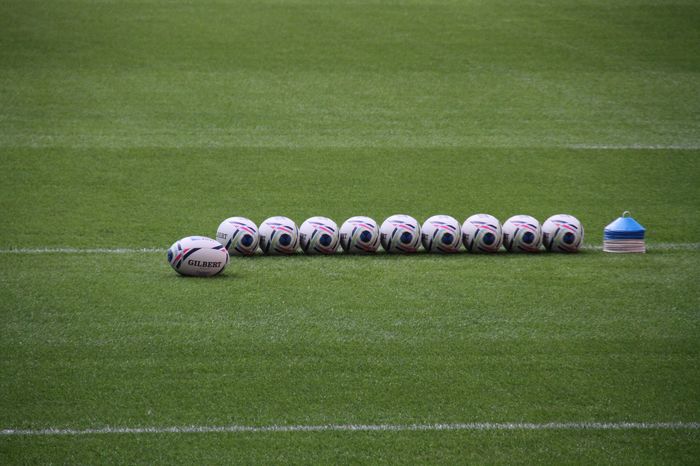What’s it like coaching girls’ rugby in a pandemic?
Anna Stirk shares her experiences of coaching in a pandemic and highlights the importance of stepping out of your comfort zone to try something new.

I had never considered coaching my old team during the pandemic but, due to the simultaneous decrease of restrictions and increase of strict regulations in training, existing coaching staff would not be enough to run training sessions for the teams. At this point, a coach could only be assigned six players and so, as a result of my previous connection with the girls’ team at the club, I was asked to return and help the coaches. There were, however, more complexities that came with such an opportunity.
I began playing with the club’s U15 team in 2016 as part of a ‘cluster’ arrangement with another local club. The emerging team was incredible and very successful, made up of mostly county players. We reached the national semi-finals in the 2017-2018 season and several members of the team had gone on to earn professional contracts and England caps.
However, following this spell of dominance, the RFU decided to break up the cluster. While this left the bigger club with more than adequate numbers of players, the smaller of the two – my club – retained around five U18 players all together and only a few more in the U15 and U13 age groups. Unfortunately, this is a common problem in girls’ rugby and was of course less than ideal for our playing careers. But, every cloud has a silver lining and the limited capacity of the club fostered a closeness between the remaining members across all age groups – something I’m sure we wouldn’t have otherwise had.
“It turns out that refereeing twelve-year-olds in a contact training game is significantly easier than convincing six grumpy teenagers to run handling drills.”
In the January of my final U18 season, I was faced with an ankle injury that prohibited me from playing for several months. This left me with no way to get involved, lingering at the sidelines during training and matches – a common and frustrating challenge that I’m sure many players who have experienced injuries can relate to. But during this time, I was asked if I would be interested in refereeing some training matches and coaching some kicking drills for the U13 squad. To my surprise, I really enjoyed it but was then in a position where I was leaving for university and reckoning that this would be my last contribution to the club.
During the first lockdown, the season and all forms of training were cancelled completely. While the professional leagues gradually started to operate again, the grassroots game looked dead in the water.
Thankfully, limited training was eventually reinstated in September, albeit with new rules. And this was the moment I was drafted in to make up the numbers for coaching. I took on short sessions with groups of six players on a rotating basis. I thought my previous experience with the U13s would stand me in good stead, but I was wrong.
“It was a valuable time in a period when there was very little joy and social interaction to be had.”
It turns out that refereeing twelve-year-olds in a contact training game is significantly easier than convincing six grumpy teenagers to run handling drills – I don’t know why I was surprised! Unfortunately, me being at the grand age of eighteen didn’t convince these players that I was the fount of all knowledge. Some of these players were only two years younger than me and relished in the opportunity to make life difficult for a former teammate. One of the players who remembered me even had the audacity to ask if I was still in sixth form. I didn’t point out to her that I’d aged out of the team two seasons before or that I was in my second year of university. I have some self-control...
Despite the challenges, coaching was one of the most rewarding things I did over the summer and Christmas riddled with COVID-19. In our final training session before Christmas – and indeed, the last one we had for a while – everyone was in high spirits despite everything crumbling around us. I had the pleasure of helping an eight-year-old and a ten-year-old through their first training session, with the even greater pleasure of mince pies at the end!
There are some things I won’t miss about coaching rugby during COVID-19 and the chlorine smell on my hand after disinfecting the equipment every ten minutes is definitely one of them. But overall, it was a valuable time in a period when there was very little joy and social interaction to be had. It’s very likely I wouldn’t have signed up without the demands placed on the existing coaches by the pandemic. I suppose that really is the point.
You never know what’s going to happen in life, or what opportunities you will be presented with. This current situation has illustrated that we never know when that privilege is going to be taken away again so we should make the most of them while we can.
 News / Christ’s announces toned-down ‘soirée’ in place of May Ball3 February 2026
News / Christ’s announces toned-down ‘soirée’ in place of May Ball3 February 2026 News / Deborah Prentice overtaken as highest-paid Russell Group VC2 February 2026
News / Deborah Prentice overtaken as highest-paid Russell Group VC2 February 2026 Fashion / A guide to Cambridge’s second-hand scene2 February 2026
Fashion / A guide to Cambridge’s second-hand scene2 February 2026 News / Right-wing billionaire Peter Thiel gives ‘antichrist’ lecture in Cambridge6 February 2026
News / Right-wing billionaire Peter Thiel gives ‘antichrist’ lecture in Cambridge6 February 2026 News / SU votes unanimously to support community kitchen4 February 2026
News / SU votes unanimously to support community kitchen4 February 2026










